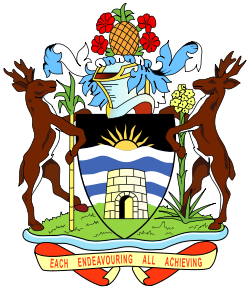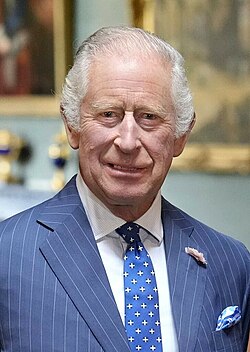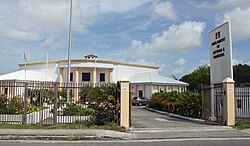This article needs additional citations for verification .(January 2020) |
 |
|---|
The politics of Antigua and Barbuda takes place in a framework of a unitary parliamentary representative democratic monarchy, wherein the sovereign of Antigua and Barbuda is the head of state, appointing a governor-general to act as vice-regal representative in the nation. A prime minister is appointed by the governor-general as the head of government, and of a multi-party system; the prime minister advises the governor-general on the appointment of a Council of Ministers. Executive power is exercised by the government. Legislative power is vested in both the government and the two chambers of the Parliament. The bicameral Parliament consists of the Senate (seventeen-member body appointed by the governor-general) and the House of Representatives (seventeen seats; members are elected by proportional representation to serve five-year terms).
Contents
- Executive branch
- Executive branch leadership
- Legislative branch
- Constituencies
- Political parties and elections
- Administrative divisions
- Judicial branch
- Movements
- Political pressure groups and leaders
- International organisation participation
- References
Antigua and Barbuda has a long history of peaceful changes of government. Since the 1951 general election, the party system has been dominated by the Antigua and Barbuda Labour Party (ABLP), for a long time was dominated by the Bird family, particularly Prime Ministers Vere and Lester Bird. The opposition claimed to be disadvantaged by the ABLP's longstanding monopoly on patronage and its control of the media, especially in the 1999 general election. The opposition United Progressive Party (UPP) won the 2004 election, and its leader Winston Baldwin Spencer was prime minister of Antigua and Barbuda from 2004 to 2014. [1]
The elections to the House of Representatives were held on 12 June 2014. The Antigua and Barbuda Labour Party government was elected with fourteen seats. The United Progressive Party had three seats in the House of Representatives. [2] ABLP won 15 of the 17 seats in the 2018 snap election under the leadership of incumbent Prime Minister Gaston Browne. [3]
Constitutional safeguards include freedom of speech, press, worship, movement, and association. Antigua and Barbuda is a member of the eastern Caribbean court system. The Judiciary is independent of the executive and the legislature. Jurisprudence is based on English common law.




